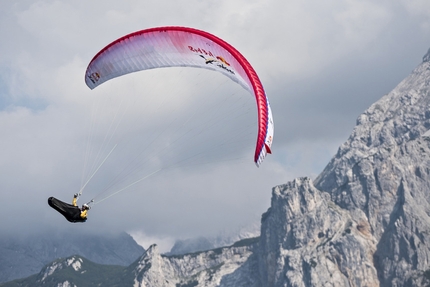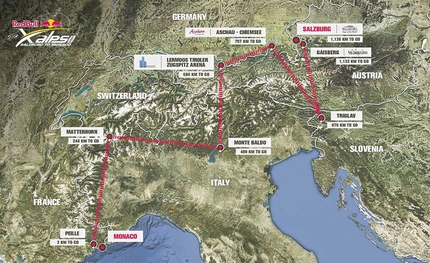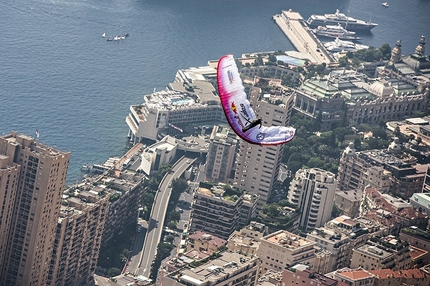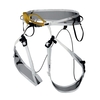Aaron Durogati and the unmissable, ever-changing air of Red Bull X-Alps 2017

 1 / 31
1 / 31 Red Bull Content Pool
Red Bull Content Pool
Aaron Durogati can't wait to take flight. The 31-year-old South Tyrolean is about to take part in his third Red Bull X-Alps, the grueling race across the Alps from Salzburg to the Principality of Monaco by paraglider or on foot that will begin on 2 July. After his 6th place in 2015 and 7th in 2013, we have now asked the two-times winner of the paragliding World Cup to talk about the Red Bull X-Alps, about his special way of experience the air, the mountains and mountaineering.
Aaron, how are you doing?
I'm very, very good. I can’t wait for the race to begin.
You're about to set out on your third Red Bull X-Alps... What can you tell us about this competition?
It's a very special comp because it's not just about paragliding, although the actual flying is obviously very important. It's definitely an endurance race because it starts in Salzburg and finishes in Monte Carlo, 1000 kilometers as the crow flies. This means that the athletes have to walk or run and then try to take off, but if the weather is poor they have to continue on foot. This is basically how the competition works… but in actual fact it’s far more complex than that because in order to fly and walk across the Alps you can’t just be a good, fit pilot. There are other important aspects that come into play such as the preparation and choice of gear, starting from the choice of shoes and finishing with specific details such as the actual glider, the equipment needed for navigation, etc. In short, it’s a very difficult and complex competition...
Put that way though is still seems almost "simple". So let's put it another way. What have you learnt from the two previous competitions you’ve taken part in? In 2013 you placed 6th and in 2015 7th.
Let’s just say that in each of them I made some mistakes from which I definitely learnt something. Starting from the navigation on the ground, but also some strategic decisions I made while flying, and even some choices I made regarding how my own energy reserves. But perhaps the biggest lesson, that is, what you’re taught by an X-Alps - which, I repeat, is a really tough comp - is the complete awareness that somehow you need to cross the entire Alps using nothing but your own strength. At least, this is what I learnt from having reached the finishing line of both editions I took part in. And this in my opinion is the greatest freedom there is for an athlete who does this sport
You mentioned an athlete who does this sport... you’re definitely a paraglider pilot, but you are also a skier and also a runner.. So what type of athlete are you?
I’m someone who tries to combine his various loves. That’s maybe why it’s not that easy to define who I am. You’re right: I'm a skier (my background is ski racing), I do a lot of steep skiing and a bit of mountaineering. I do all these things to combine my various passions.
So what’s your greatest quality?
In reckon it’s the fact that I’m 100% committed to everything I do. I don’t think I’m particularly talented, but when I set myself a goal I really commit myself to it and train really hard. That’s why I’ve managed to become so good at the things I’m really interested in during the last few years. And this obviously has allowed me to combine various different activities. For example, last winter I climbed a lot of ice and then flew back down with my climbing partner. Or I also managed to combine ice climbing with ski mountaineering, and also discover some new speed riding lines. So there are many things all mixed into one. And I also managed to win the paragliding World Cup for the second time... so yes, maybe it’s not easy to put a finger on it and define precisely who I am.
But maybe you can tell as about your typical "training days" for this X-Alps ...
My training varies considerably, depending on whether there’s snow or not. In winter I basically go ski mountaineering every day for at least 3, 3.5 hours past 2000/2500m altitude gain, followed by some paragliding and then, in the evening, I do some weights. When there’s no snow I run a lot. Mostly uphill (with a paraglider on my back, with weighs about 2.5 kg): I run up about 1500/2000 meters and then fly back down.
So how many hours a day and how many days a week do you train?
I train six days a week either flying, skiing, running and working out in gym. On average I train for about 5 to 8 hours a day. I try to rest one day a week… I say try, because even on rest days I always need to “move about”. And I’ve discovered that my way of relaxing and at the same time doing something is through slacklining.
In the 2015 edition of X-Alps you were 3rd a mere 11 km from the finish line at Monte Carlo, but then you ended up 6th overall. What happened?
I made a bad decision. Just like in all competitions, in order to achieve a good result - in this case not overall victory but a place on the podium - I had to make a risky decision… that didn’t pay off. It’s that simple.
Why did you define the 2015 Red Bull X-Alps as extreme? The X-Alps is, by definition, an extreme event
Because that year we had at least 3 days during which the weather conditions were well beyond the limit, the winds were so strong it was difficult to control being up in the air. Let’s just say that instead of controlling the flight, you had to deal with the punches. Flying in conditions like these are really difficult mentally: from the moment you take off, you know you won’t be able to land until that evening, because the wind is simply too strong. So you know that until that evening you'll be in the air receiving one blow after the next...
And perhaps not get very far…
Actually, one day I didn’t make much progress because I had strong headwinds, but on another day the wind was on my side and I managed to cover more than 200 kilometers. But it was really an extreme experience because it’s impossible to deal with a situation that’s so out of your control. So you have to remain calm and focused and say, "Okay, I'm up here now and can’s get off this carousel anymore."
So it’s not true that when you’re up in the air you're happy and smiling, and that those are the most relaxing moments of the X-Alps…
No, no ... the most relaxing moments are when you're on the ground, because although it’s true that you have to walk and run, you don’t need to use your brain. Instead, when you're in the air ... Flying certainly isn’t physically as difficult as running up 4000 or 5000 meters. But what makes flying really difficult is the fact that your brain needs to be on overdrive, constantly, it’s in charge of absoutely everything. When you’re flying you need to be fully concentrated, always.
In moments like the ones you’ve just described, how important is risk?
A competition like the Red Bull X-Alps takes you close to the limit. It depends on how the days evolve, it's the weather conditions that make a flight more or less risky. I try to be as safe as possible. On days when the wind gusts at 50/60 km per hour you shouldn’t go paragliding... but we were all up in the air nevertheless... yeah, for sure it’s a competition that takes you to the limit.
But you are trained to deal with this limit, right?
For sure. And this is also why big accidents have never occurred.
It's no coincidence that you are a select team, you’re super pilots... by the way, this is probably a stupid question but: what qualities does someone need if they wish to go paragliding?
I believe it’s essential that they must really want to do it. If someone wants to, they can.
I guess though that, like so many other things, it’s not easy ...
Yes, like all things. But I do not think it’s any harder than learning how to ski.
So what characteristics do you need to have in order to take part in Red Bull X-Alps?
Many different things all at the same time. Huge flight experience. Planning experience. Fatigue management. You have to be an athlete. You have to be able to walk 60 or 70/80/90 kilometers day in day out... in short, to deal with maximum pressure for at least 8 to 10 days in a row.
How much competition is there between you guys?
There is a good relationship between all the various athletes. Sometimes you find yourself with other teams, grappling for the same position, but nevertheless we always help each other. In 2015 the Switzerland 2 guy had to use his emergency parachute. I was there and helped him sew his harness because it had broken. There’s an underlying spirit of helping each other. Also because you’re all in it together, doing something that is enormous. Yes it’s a competition, but it’s also an adventure, so if you can help someone, you do. Obviously when you get towards the end if you can overtake someone you do , but if you can help them on equal terms, then you do so, too.
Talking about competition, what springs to mind if I say Christian Maurer?
That he’s certainly the reference point for the X-Alps: he has won 4 in a row so he is definitely the reference point. What else springs to mind? That we’re friends, that he’s a great person and.. that I hope to beat him!
Of course ... so what’s you aim for this X-Alps?
To win of course. But I’d have said exactly the same thing in 2013 and in 2015. From the moment I start to race I always try to win, but we’ll see how things evolve. I certainly gained a lot of experience during the past two editions so I definitely have greater chances of winning now than I did 2 or 4 years ago.
You know that mountaineers say the most important thing for them about being up in the mountains is that they manage to understand something about themselves... Does the same happen to you in these competitions?
I’d say that this happens more in other situations. It’s true that in competitions of this sort you’re confronted with yourself and that you become really aware of your personal limits, but in truth it’s in other moments that I understand more about certain aspects of myself.
Such as?
When I’m up in the mountains alone, doing things like speed riding or mountaineering ... Because a competition like X-Alps is so intense, I at least find it hard to find the time to think about myself. However when I'm in the mountains on my own, I'm not there to compete but to interpret my vision of a line or do something else... and then it's a lot easier to think about myself and try to get to know myself better.
At the X-Alps each pilot can count on a ground support team. How important is this team? Can you introduce them to us quickly?
The team is extremely important for the outcome, positive or negative, of the X-Alps because from a certain point onwards, when I start to get really tired, I’ll discuss decisions with the team. We’re a team of 4... Ondrej Pprochazka, in charge of flight planning and strategy, Matteo Vettorel, who is the team coordinator and reference point for the race organization, Isidor Fink who’s in charge of ground and flight support and Tazio Isgor, my physiotherapist who will also help me with food management.
You started paragliding with your father when you were 6, you’ve been flying on your own since you were 15... Can you still remember that first time with your father? Was it love at first sight?
I only remember it vaguely ... but ever since I was a young child I’ve always want to fly on my own. So flying with my father wasn’t the most special thing in the world: all I wanted to do was fly alone. In fact, I can vividly recall that first flight on my own. I’ve only ever flown 5 or 6 times with my dad because I wasn’t interested in flying with someone else. I've always wanted to fly alone.
As a skier you know all about the different snow layers and snow conditions… from your perspective as a paragliding pilot, is the air always the same? How would you describe the air when you’re in flight?
When you fly the air is always different. And this is what makes it so great: you never encounter the same conditions. Perhaps the most beautiful thing of all is that since you can’t see how the air moves, you need to imagine it. You need to rely a lot on your experience, on your imagination and knowledge in order to make your decisions and it’s really gratifying when you see you made the right choices and you manage to find the right thermals that enable you to fly back up again. At the end of the day air is a bit like water, except that you can’t see it. So it there are turbulences or thermals out there, you need to imagine them first.
So how do you imagine the air will be in the upcoming X-Alps?
I’m going to experience it day by day! There’ll certainly be times when I’ll have fun and others when it’s going to be tough. Just like in the previous two X-Alps, it’s going to be a mix of all sensations possible.
RED BULL X-ALPS 2017
Red Bull X-Alps 2017,the 8th edition of the world's toughest adventure race, will being on 2 July. Follow the competition on redbullxalps.com and www.redbull.com and on Facebook facebook.com/redbullxalps.



 Copia link
Copia link









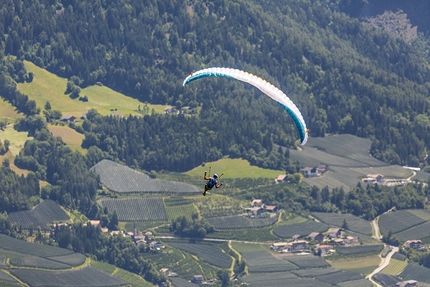








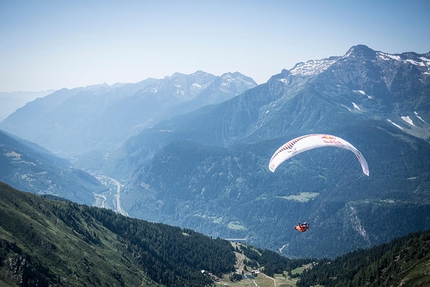
 See all photos
See all photos